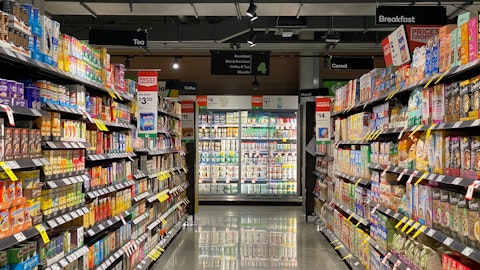Operator: Our next question comes from Krisztina Katai with Deutsche Bank. Please proceed.
Krisztina Katai: Hey, guys. Thanks for the question. So RJ, I just wanted to follow up on the system upgrades. I mean, it does sound like you anticipated some disruption, but then it has actually come in well ahead of that, like, one, is that a fair characterization, and then two, is it fair to say that this doesn’t alter any of the margin structure into next year or the long-term and you will essentially be able to fully recapture all of the margin pressures once you lap the third and the fourth quarters?
RJ Sheedy: The — yeah, for your first question, that is a fair characterization. We did expect — this is a big transition from a legacy platform that we have been operating on for the past several decades. So and it’s something that we have been working on for a couple of years now. So we have always known how large it was and complex. We did expect as a result, some disruption, certainly, not to this degree or this magnitude. So I think you characterized it well. And then, in terms of impact looking forward, and I think, similar to the earlier question, we — as I said, we do the transitional impact to be contained to this year, from what we have already experienced in the third quarter and then largely behind us at the end of the year. So you should think about us reverting back to previous performance and all the things that we have always talked about related to consumer trends, topline sales and how we have managed for both gross margin and bottomline profit.
Krisztina Katai: Got it. Thank you. And just as a follow-up, I had a question on the IO pipeline, especially as you are planning your 2024- and 2025-unit expansion plan. Last quarter, you provided some very helpful statistics on average IO net income. But just the question is, do you have any concern in or any difficulty maybe attracting top talent in future years, especially just thinking if rates stay higher for longer, is that something that you are concerned about?
RJ Sheedy: No. No. We don’t have any concerns about that. There are more than enough potential future operators. It’s a really attractive model. They get to own and operate their own business. They have got the combination of independents together with the support and scale that we provide. They work with family. They have this opportunity to give back unlimited financial upside. We have talked — we talked on the last call about some of the economics, favorable economics and average operator income. So no, there are a lot of people out there and the leads continue to be really healthy annual leads, we mentioned last time, is around 30,000. And so for us, the work is to make sure that we are finding the best candidates and the right fit, and so we do go through an extensive process and it goes both ways, it needs to be the right fit for them as well. But, yeah, no concerns about the IO pipeline to support future stores.
Krisztina Katai: Great. Thank you so much.
RJ Sheedy: Thank you.
Operator: The next question comes from Joe Feldman with Telsey Advisory. Please proceed.
Joe Feldman: Hi, guys. Thanks for taking the question. I guess just one more on the systems transition. I guess I was kind of curious about the staging of it. You guys are always very methodical, like, even like the app, take your time testing, learning and I was curious as to — was there a reason behind needing to flip the switch on all those systems at once versus staging it a little bit more?


